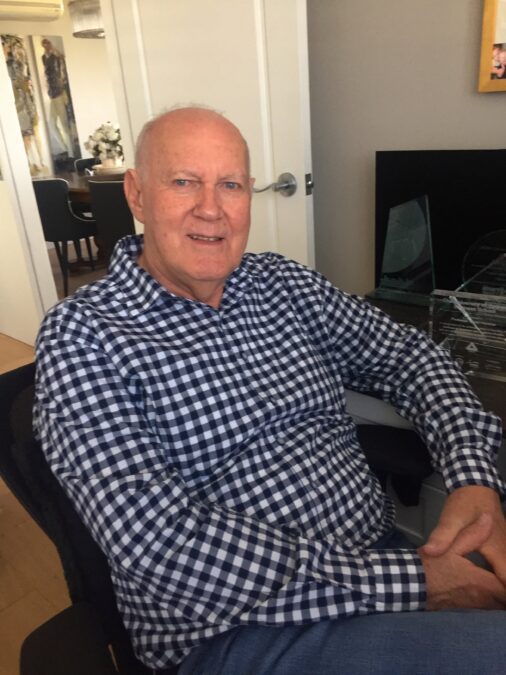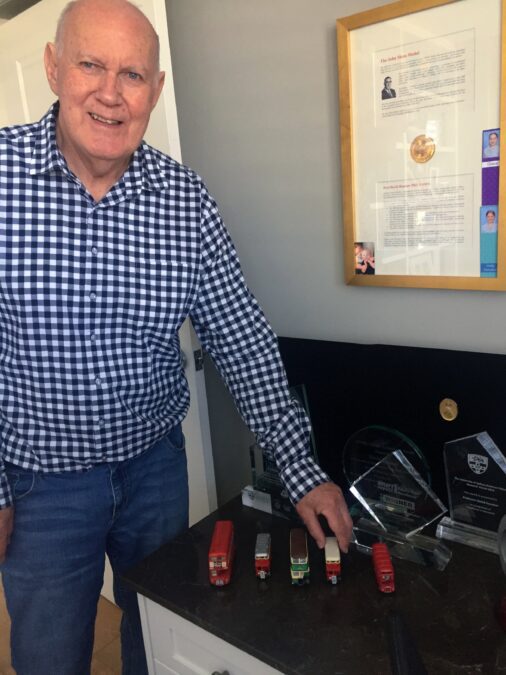Jacquelyn Hole and David Hensher

Planes, trains and automobiles – David Hensher’s moving life
He’s an academic with an enviable Google Scholar citation score (over 67,000), a heft of academic and industry awards, and an Order of Australia for his work in the transport sector.
Professor David Hensher has been the head of the Institute of Transport Logistics (ITLS) for more than 30 years. He is ranked number one scientist in the world in transport logistics, and the ITLS he founded is #4 in the world in the field of discrete choice models (more on those later).
With those kinds of numbers, a chat with David Hensher really adds up.
What is it about the how and why of transporting people that grabs you?
Studying challenges to do with congestion, parking and pollution is really interesting. Also it’s a good use of economic theory applied in a policy area.
Transport involves a set of econometric tools, known as discrete choice modelling, that try to explain why people make certain choices. A lot of econometrics is time series data, whereas this is trying to drill down from a behavioural point of view. It’s an interface between transport economics, microeconomics, and what’s now known as behavioural economics.
What is discrete choice modelling (and why does it matter)?
Discrete choice is, for example, where you have a choice between a bus, a train, or the car and which one would you choose? Historically, discrete choice modelling always assumes that everything mattered. And we’re saying ‘no, that’s not how the world works’. Behavioural economics says you bring some sort of heuristic to bear to simplify the environment in which you make a choice. While we might process information in complex ways, at the end of the day, we’re still looking for some fairly simple solutions to make a choice. How we capture all that is a combination of economics and psychology.

What does the ITLS do?
We wanted initially to be recognised in Australia, as the place you would go to do research or graduate studies in the broad area of transport management, which is economics, planning, policy, engineering, the whole bit. I wanted it set up with a portfolio of activities. It’s not just research, we offer graduate teaching and short courses and executive programmes, and engage extensively with industry and government as part of ensuring our relevance. That’s why I think we’re so successful. Our longevity is due to the scope of our offerings – we are now a global brand.
The ITLS has been voted the 4th most important institute in the area of discrete models – don’t be modest: tell us why?
You know, this began as a maverick group – it went right against the traditional grain.
Murray Wells (the former Dean) told me ‘I took a risk on you Hensher and it worked’. He meant because we wanted to do things that people said can’t be done. We introduced the master of logistics management and the master of transport management. I have to say we were able to generate a lot of interest in research funding to be able to hire some really good people. I think the other thing that’s successful is I’ve hired very well: people who brought with them, not only their reputation, but the ability to bring in more money, attract good PhD students. We’ve got 33 at the moment. It’s the magic of the framework in which ITLS generates enthusiasm and energy.
What’s the basis of the ITLS reputation?
Our research – we publish more papers per academic in the top transportation journals, than almost anyone else in Australia. We’re up there in the world. We can compete with the MITs, the Oxfords in this space, and we do. Our research also has impact beyond academia.
That, and also our strategic vision.

What’s an example of that strategic vision?
The best example is developing partnerships with industry and government. I went to see the then-Deputy Premier of NSW, John Watkins. I said, ‘I think we should fund a chair in public transport, John’. And he said, ‘That’s a damn good idea because I’m sick of the uninformed commentary in the media, and we need some objective commentary from universities.’
That chair has been going now for 17 years.
One of our great alumni, Neil Smith, who did his masters here, he’s one of the biggest bus operators globally. He operates buses in Adelaide, Perth, Sydney, London, Singapore. So last year I said, ‘Neil, it would be great if you could support ITLS in recognition of the benefits you gained, as you often told me from your master’s study with us.’ So he gave us close to eight million dollars. That let me set up the Neil Smith Chair in sustainable transport futures and the Neil Smith research lectureship.
You don’t strike me as a typical academic.
We work hard in building up relationships with government, industry, and politicians of all persuasions. And we’re out there all the time doing what academics do poorly – too many sit in their office and they hope someone will knock on the door. When I’m involved with the engagement committees here in the Business School, often someone says, ‘I’ve got a good idea and unsure of the next steps’. Well, that’s great. My response is to tell them to go to some trade conferences and see who they can meet. I tell them if there’s one person interested in what you’re doing, build that up. If you go to an academic conference, you’re not going to build those relationships.
What have you done that’s had the most impact?
I developed a new formula to evaluate the travel time benefits of improvements in projects that save travel time. And people in the Netherlands started calling it the Hensher equation, then the Scandinavians picked it up. And now it’s in guidelines in all sorts of countries as the methodology to use if you’re trying to value time for project appraisal? There aren’t many people that have an equation named after them. I’m very proud of that.
What is your best advice to young researchers?
I want people to be highly qualified in a fundamental skill that you get at the undergraduate level, be it in engineering, in mathematics, economics, statistics. When they come to us, their research is highly multidisciplinary, but they need to have a fundamental skill as a base.
What makes you most proud?
You know, the thing I’m most proud of, is the quality of the graduates, be it in the coursework or PhDs that come out of this place. Some are now in very important positions of influence, including one person who came to Australia as a refugee – Anoulack Chanthivong. He’s now doing his PhD with us, and he is also the new Minister for Industry and Trade in the NSW Government.
Image: Connor Williams
Jacquelyn is the media producer and the content editor at Sydney Business Insights.
David Hensher is Professor of Management, and Founding Director of the Institute of Transport and Logistics Studies (ITLS): The Australian Key Centre of Teaching and Research in Transport Management in The Business School at The University of Sydney.
Share
We believe in open and honest access to knowledge.
We use a Creative Commons Attribution NoDerivatives licence for our articles and podcasts, so you can republish them for free, online or in print.







